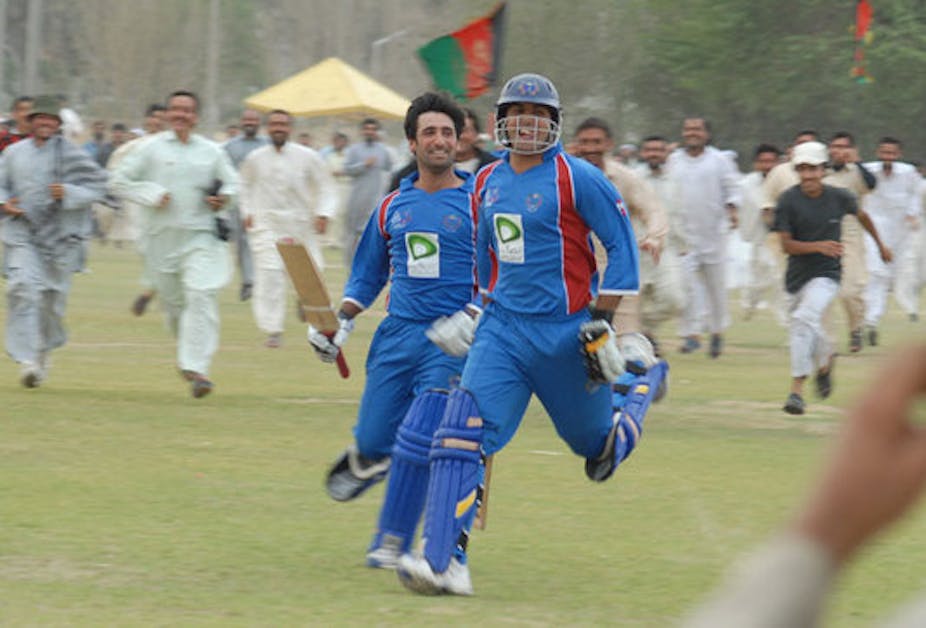Sport has emerged as an unlikely hero for one nation that continues to deal with violent internal conflicts. Afghanistan beat Australia at last month’s under-19 Cricket World Cup in Abu Dhabi, while the war-torn nation’s senior team has just been eliminated from the Asia Cup tournament.
Beating Australia’s under-19 team is no small feat. But it is their ability to bring together and sustain a successful team under trying political circumstances that is perhaps the most remarkable achievement of these Afghan cricketers.
So, could the cricketers become unlikely ambassadors for their country and help Afghanistan in its current state of volatility? After all, we have seen before how sport can break down barriers in nations torn by conflict, if only temporarily.
In 2007, Iraq’s national soccer team completed one of sport’s great fairytales by winning the Asian Cup. The victory provided a rare moment for celebration in the war-torn nation. As Iraq’s Brazilian coach Jorvan Vieira told a news conference following his side’s success:
This has brought great happiness to a whole country. This is not about a team, this is about human beings.
Today’s world leaders recognise the significance of sport as a platform for promoting peaceful co-existence. All 193 United Nations (UN) Member States co-sponsored the latest UN resolution on the Olympic Truce, signing up to the ideals of peace and conflict resolution and the premise that sport should be free from interference of politics or religion.
South Africa’s first black president Nelson Mandela once said:

Sport has the power to change the world. It has the power to inspire. It has the power to unite people in a way that little else does. Sport can create hope where once there was only despair.
Mandela famously used the South African national rugby team, the Springboks, to unite a then-divided nation around a common goal: to win the 1995 Rugby World Cup in South Africa. This presidential mission was immortalised in the 2009 film Invictus. One of Mandela’s celebrated leadership lessons was to:
Know your enemy – and learn about his favorite sport.
Success stories – there are a few. But unfortunately the reality is more complex. In light of the recent Winter Olympic Games in Sochi, which were overshadowed by controversy over Russia’s anti-gay laws, is elite sport not doing more harm than good when it comes to conflict resolution?
It is true that sport has excessive competition, racism, sexism, chauvinism and doping, so surely there are better ways to create a more peaceful world. Millions of Brazilians certainly think so. They have mounted a series of protests against massive government expenditure on the hosting of the 2014 FIFA World Cup and the 2016 Olympic Games. Protesters declared:
We don’t need the World Cup, we need health and education.
While sport has at times contributed to bringing a sense of “normalcy” to volatile nations, more often it has served as a site for political conflict or the furthering of political and nationalistic objectives.
The United Arab Emirates has been accused of using soccer to launder its image, which has been tarnished by autocratic and counter-revolutionary policies. The Sochi Games may also be viewed in this way, as activist Ruth Hunt wrote:
As the Olympic flame is extinguished in Sochi, homophobia is still burning bright.
It would be naïve to view sport, in and of itself, as being capable of transforming the types of conflict facing countries like Afghanistan or Iraq. If sport is to be a “saviour” for nations suffering conflict, then surely it must be used as but one small element in a comprehensive set of conflict transformation strategies.

The journey of cricket in Afghanistan is inspiring and we can draw some positives from it. It validates the idea that bringing people together into a sporting arena can potentially contribute to the assertion of a shared citizenship, or at least serve as a temporary escape from political and social tensions.
However, with such short-term success comes immediate challenges. Cricket is the only sport that the Taliban approves of as trousers and protective padding cover most body parts. Recently, the Pakistani government engaged in “cricket diplomacy” by offering the Taliban a cricket match to revive peace talks. They declined the offer, but continue to use cricket as a means of expressing their views about the world.
When the great Indian batsman Sachin Tendulkar retired last year, a Pakistani Taliban spokesperson criticised those who acknowledged Tendulkar’s brilliance because he was an Indian. Tendulkar was “against the Pakistani nation and our motherland”. Clearly, Afghanistan’s success can very quickly be hijacked by those who are not interested in nation building.
Sport is not a panacea for violent conflict. It can provide a window of opportunity during which small gains can be made towards greater mutual recognition and solidarity. But even then, one has to be vigilant about those who incite the violence in the first place.
With this in mind, our eyes are already on the 2015 Cricket World Cup, to be hosted by Australia and New Zealand. Can the Afghanistan cricketers repeat their success, and, in doing so, bring some happiness to their homeland? Or will it be the Taliban that will claim victory in the battle for association with cricketing success?

